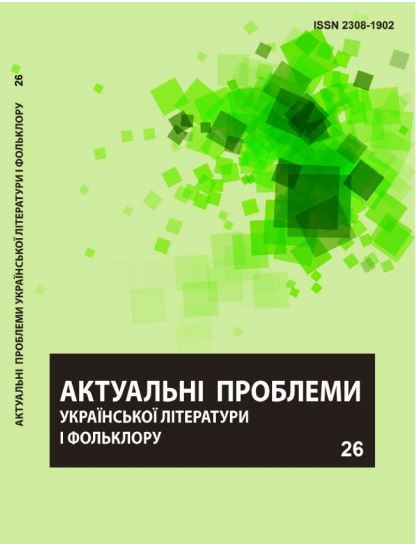Panoptikum of Mykola Khvylovy (From observation of the short story “I (Romance)”).
DOI:
https://doi.org/10.31558/2308-1902.2018.26.15Keywords:
expressionism, power, non-freedom, utopia, suicide, ethicsAbstract
The article is devoted to the comprehension of the chronologically well-known short story by Mykola Khvylovy “I (Romance)” in the moral and ethical aspect, which accumulates the notion of creativity, non-freedom, power, utopian projects, etc. important to the writer and his generation of the 1920s. There is also an attempt to trace the vicissitudes of the formation of the voluntarist literary consciousness of the writer, in which self-manifestations of the artist's ups and downs, associated with non-literary (political) factors.
Mykola Khvylovy as an expressionist already in the first prose works demonstrates a unique understanding of the actual problems and the only acceptable style of his time. Attentive reader in Khvylovy's prose opens an expressionistic picture of the world, which is difficult to confuse with some other worlds, other colors, and other music. Because instead of music in Khvylovy's well-engineered works, the cry of desperation of a really threatened or entirely hunted Ukrainian man is well-known. Incomplete, total and final, suppresses Khvylovy's characters in many, if not most, works of the writer, written in different periods of creativity.
The short story “I (Romance)” belongs to the mature writer's writings, although written in the beginning of 1923, having fallen to the collection “Autumn” (1924). This is one of the works that not only extends, but also deepens the author's understanding of the world as a system of a miraculously hermetic and destructive life for the human individual. This theme was clearly stated by Khvylovy in the collection “Blue Etudes” (“Editor Kark”, “Cat in Boots”, “Chumakivska Commune”, “Road and Swallow”, etc.), but in the short story “I (Romance)” occur things are unprecedented, both for life and for literature, and the system of specific characters of novels indicates that something much worse is expected ahead of society. For the one who did not regret his own mother, will not regret another's mothers, this is an axiom. “I (Romance)” − the product is consistently and deeply unrealistic already due to the lack of socalled typing, because we have to consider the case, nevertheless, extraordinary and, say, unnatural.
References
Іванишин П. Національний спосіб розуміння в поезії Т. Шевченка, Є. Маланюка, Л.Костенко: монографія. Київ : Академвидав, 2008. 392 с.
Любченко А. Спогади про Хвильового. Ваплітянський збірник / вид. 2-ге, доповнене. Торонто : Мозаїка, 1977. С. 33–46.
Москалець К. Час на дотик. Критика. 2010. Число 7–8.
Поліщук В. Обметиця хуторянства, або українська пільняковщина Хвильового та инших. Пульс епохи: Конструктивний динамізм чи войовниче назадництво? Харків : ДВУ, 1927. С. 64 – 105.
Хвильовий М. Я (Романтика). Хвильовий М. Твори: в 2-х томах. Київ : Дніпро, 1990. Т. 1. С. 322 – 339.
Шаповал Ю. Фатальна амбівалентність. Критика. 2009. Число 7–8. С. 21–27.
Полювання на «Вальдшнепа». Розсекречений Микола Хвильовий: науководокументальне видання / упоряд. Ю. Шаповал; передмова: Ю. Шаповал, В. Панченко. Київ : Темпора, 2009. 296 с.
Шерех Ю. Хвильовий без політики. Шерех Ю. Пороги і запоріжжя: в трьох томах. Харків : Фоліо, 1998. Т. 1. С. 57–68.
Шерех Ю. Шоста симфонія Миколи Куліша. Шерех Ю. Пороги і запоріжжя: в трьох томах. Харків : Фоліо, 1998. Т. 1. С. 69–80.

